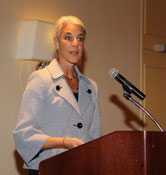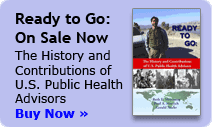On this Page
2013 Annual Banquet
Keynote Speaker
Beth Meyerson

On Thursday evening, November 7, 2013, the Watsonian Society (a CDC employee organization) held its 28th Annual Banquet at the Marriott Century Center Hotel. The program included the presenting of the Honorary Public Health Advisor Award to Gus Conda (deceased) and the Outstanding Public Health Advisor Award to CDC employee, Norm Fikes. A special recognition award was given to Addie Simon, Los Angeles County Health Department, for her 39 plus years of service to the many Public Health Advisors who worked at the LA County HD. It also involved reports from the Watsonian Society Committee Chairs and a special report from Kristin Brusuelas, Director, Field Services Office, OSLTSL, on the hiring status of Public Health Associates. Public Health Advisor, Dr. Deymon Fleming, was introduced as the new incoming President of the Watsonian Society.
The highlight of the evening was the address of the keynote speaker, Beth Meyerson, M.Div., Ph.D. Dr. Meyerson is currently Assistant Professor of Health Management & Policy and Co-Director, Rural Center for AIDS/STD Prevention at the Indiana University School of Public Health. She is also the lead author of the book, Ready To Go: The History and Contributions of US Public Health Advisors which was published a few years ago. Her two co-authors for this book are retired Public Health Advisors Fred Martich and Jerry Naehr.
Dr. Meyerson's speech to the more than 100 persons in attendance, including special guests Karen Rowles, daughter of Bill Watson, and her husband Tom was titled "The Horizon and Our Leadership Task." The audience was composed mainly of current and retired CDC Public Health Advisors with guests and CDC Public Health Associates and Public Health Prevention Specialists. She indicated that in her academia role she is able to explore research questions such as "can we reduce cervical cancer screening and follow up disparities by integrating the services in STD? OR Can we extend the public health reach of pharmacies for HIV testing, childhood immunizations (revisited), HPV vaccination, etc."
In addressing CDC Public Health Advisors, Dr. Meyerson specifically stated three distinct messages:
- "Public health will continue to need (though it may not always recognize) the unique and important skills set offered through the PHAs, PHPS and PH Associates.
- Our value is in our strategic evolution: We need to learn from the ‘bugs’ we chase: We need to act a bit more like the viruses we fight (ever evolving and resistant to 'elimination')
- Our evolution is not about adaptation but vision and ability to see the horizon in order to anticipate and even steer the change."
For the first message, she said that one of the key issues is "The importance of the PHA, PHPS, PH Associates programs is that they prepare and sustain a readiness-oriented, highly trained, and nationally focused public health worker." She went on to say, "Are we as ‘ready to go’ as we used to be? Only you can answer that as you consider the evolution of the series and the evolution of our federal level public health workforce. In what ways are you as ready, flexible/lithe and prepared? In what ways are you not?"
With regards to the second message listed above, she said "The challenge, however, is really about creating the national public health capacity that we need without having a completely federal public health workforce or a completely devolved workforce where quick deployment of public health resource in response to a need somewhere in the world becomes impossible. I see your strives toward striking that balance as I have observed the evolution of the programs over the years. My hope is that you have the space and time for vigorous debate — not just at federal level — but with local and state health partners to help define the need."
Lastly, in addressing message number three, Dr. Meyerson said "In my opinion, our horizon involves likely the biggest system change for local and state public health: local health accreditation. It also involves our healthcare reform, currently ACA, but clearly beyond it. It continues to involve a set of tools that I think the series (and public health) have yet to claim centrally: policy and systems."
With regards to accreditation of health departments for services under the Affordable Care Act, Dr. Meyerson indicated "As of mid-August, there have been (only) 19 health departments who have received 5-year accreditation." In her home state of Indiana, she said "we are observing at least 40% of our 93 local health jurisdictions moving toward accreditation…we have a primarily state focused effort, with over 66% of the LHDs who are heading to accreditation without the help (or in most cases even knowledge) of the state health department."
Dr. Meyerson then related these messages to Public Health Advisors, Associates and Prevention Specialists in the audience by saying that "If you are puzzling over this and wonder just how we can prepare our work force to enhance the capacities to facilitate accreditation preparation in local communities, then you are seeing the horizon issue. Back in the day, the ‘feds’ helped the state reprioritize and focus in on, say, syphilis or TB or chronic diseases or (fill in the blank). This refocusing and redirecting through facilitation and support, mediated by federalism of course — is the essence of what these men and women in all three series are called to do."
In addressing the ongoing issue of reform, Dr. Meyerson stated that "…we have to train our people to understand system reform and organizational change — managing strategic change and doing so in the midst of the dance that you must do as federal people in state and local contexts." She further indicated to the CDC people present that "...you must consider this an important area for focus and assure that the men and women who are future PHAs, PHPS and PH Associates are ready and able to a) recognize where they are and what is happening around them system and organization wise, b) know where things must go to enhance public health outcomes structurally and c) know how to get there — or at least know how to pull together the partners that will help drive that direction."
Dr. Meyerson ended her presentation speaking about change in the world and in public health when she quoted Gandhi, "If we could change ourselves, the tendencies in the world would also change. As a man changes his own nature, so does the attitude of the world change towards him. ...We need not wait to see what others do." She closed by saying, "I challenge you to become part of that movement to evolve and transform and assure the READINESS of our PHA, PHPS and PH Associates for the future of public health."
Banquet Photos
Click on thumbnail image to open larger image gallery.
Page last updated January 21, 2014
The contents of the Web site or communication of employee association information through other government resources does not constitute or imply endorsement of the operations and activities of the association by CDC or the U.S. Department of Health and Human Services.

